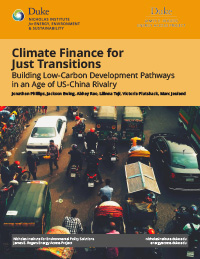Publications
Climate Finance for Just Transitions
This paper investigates challenges in the international climate finance landscape through three issue areas: (1) aligning national climate strategies and international finance, (2) finding avenues for positive climate finance outcomes in an era of growing rivalry between Chinese and Group of Seven—particularly US—public financiers, and (3) reforming major climate finance practices and institutions to more effectively cater to the needs of LMIC stakeholders.
The Role of Taxes and Subsidies in the Clean Cooking Transition: A Review of Relevant Theoretical and Empirical Insights
Cost barriers are among the most significant challenges impeding progress toward use of clean cooking energy in low- and middle-income countries (LMICs). This brief discusses the role of subsidy and tax policies—levied on both the supply and demand side—in affecting progress toward universal access to clean cooking in LMICs. Also, combating a common myth among those opposing subsidies for clean cooking, the brief demonstrates that a “fear of spoiling the market” with such incentives finds little empirical support in the literature. Finally, the brief offers recommendations to policy makers.
Improving Rural Livelihoods, Energy Access, and Resilience Where It’s Needed Most: The Case for Solar Mini-Grid Irrigation in Ethiopia
Ethiopia’s levels of agricultural productivity and energy access are among the lowest in the world. Now Ethiopia is moving forward with the new Distributed Renewable Energy-Agriculture Modalities (DREAM) project to test distributed solar mini-grids as a solution for improving irrigation, increasing agricultural productivity and farmer incomes, expanding rural electricity access, and enhancing gender and social inclusion. This policy brief summarizes the approach, along with findings of an economic viability analysis examining how the solar mini-grid irrigation projects are likely to impact farmers' incomes at nine unique sites in rural Ethiopia.
Catalyzing Climate Finance for Low-Carbon Agriculture Enterprises
Despite minimal contributions to causing climate change, rural households working in the agriculture sector are disproportionately impacted by climate-related shocks and see it as one of the biggest risks to their livelihoods.
Graphical Models and the Challenge of Evidence-Based Practice in Development and Sustainability
In development and sustainability, evidence spans disciplines and methodological traditions and is often inconclusive. Graphical models are widely promoted to organize interdisciplinary evidence and improve decision-making by considering mediating variables. However, the reproducibility, objectivity and benefits for decision-making of graphical models have not been studied. In this paper, the authors evaluate these considerations in the setting of energy services in the developing world, a contemporary development and sustainability imperative.
The Energy Access Dividend in Honduras and Haiti
Governments face important decisions regarding how to balance power quality, quantity, and reliability priorities with how to ensure all populations receive access as quickly as possible. Identifying the pathway that best fits the needs of the country requires a detailed understanding of the benefits that accrue to different populations under different scenarios and timelines. The Energy Access Dividend in Honduras and Haiti develops a methodology to quantify and monetize benefits generated through accelerated electricity access.
Aligning Evidence Generation and Use Across Health, Development, and Environment
Although health, development, and environment challenges are interconnected, evidence remains fractured across sectors due to methodological and conceptual differences in research and practice. Aligned methods are needed to support Sustainable Development Goal advances and similar agendas. The Bridge Collaborative, an emergent research-practice collaboration, presents principles and recommendations that help harmonize methods for evidence generation and use.
Research Agenda on Electricity Access and Productive Use
On February 21, 2019, Duke University’s Energy Access Project and Oxfam cohosted a meeting of approximately 60 energy practitioners and researchers to discuss the role of electricity access in spurring productive use. A motivation for this convening was a paper, produced by Oxfam, which had been confounded by the mixed findings on the impact of electrification on productive use.
Harnessing the Power of Data: Sustainable Energy Transitions Initiative Conference
Energy developers, utilities, planners, and policy makers are often not equipped with the necessary tools to understand the changing landscape of energy delivery options and customer preferences. Researchers and grid operators are often restricted by outdated, unavailable, or biased data in the field. Through innovative methods and analytical tools, such as remote sensing, satellite imagery, and machine learning, data analytics are improving our understanding of energy demand in rural areas, customer needs and expectations, the local availability of energy resources, and the realities of providing electricity to underserved communities. These proceedings from the 2018 annual conference of the Sustainable Energy Transitions Initiative present takeaways related to the conference's core theme of energy data analytics.
Benefits, Costs, and Distributional Impacts of a Groundwater Trading Program in the Diamond Valley, Nevada
In Nevada’s Diamond Valley, unsustainable groundwater pumping has decreased the aquifer’s water level, raising irrigators’ pumping costs and threatening the viability of existing wells and springs. Continued extraction in excess of natural recharge will trigger a legally required curtailment of water rights in the valley, which was recently declared a critical management area (CMA). The extent of rights curtailment is not mandated, but it could be as high as 64%, the amount required to reach the estimated natural recharge rate. The default policy for curtailment of water rights will occur according to the principle of prior appropriation, whereby rights are revoked in reverse order of their date of issuance. Rights granted most recently will be canceled first, and the revocation will proceed in order of increasing seniority until the government’s desired level of total water extraction is reached. Nevada law requires this intervention to occur within 10 years of the CMA declaration. This report analyzes the economic outcomes of sudden and alternative curtailment policies, using a hydro-economic model tailored to conditions in the region.










